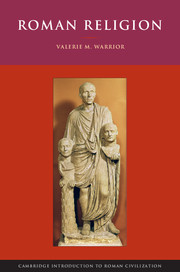Book contents
- Frontmatter
- Contents
- List of Illustrations and Maps
- Preface
- Acknowledgments
- 1 The Gods and their Worship
- 2 Divination, Prayer, and Sacrifice
- 3 Religion and the Family
- 4 Religion and the State
- 5 Religion and War
- 6 The Calendar, Festivals, and Games
- 7 Official Attitudes toward Foreign Cults
- 8 Magic and the Occult
- 9 Becoming a God
- 10 The Jews and Christianity
- Chronology
- Maps
- Gods
- Glossary
- Ancient Sources
- Bibliography
- Illustration Credits
- Index
9 - Becoming a God
Published online by Cambridge University Press: 05 February 2015
- Frontmatter
- Contents
- List of Illustrations and Maps
- Preface
- Acknowledgments
- 1 The Gods and their Worship
- 2 Divination, Prayer, and Sacrifice
- 3 Religion and the Family
- 4 Religion and the State
- 5 Religion and War
- 6 The Calendar, Festivals, and Games
- 7 Official Attitudes toward Foreign Cults
- 8 Magic and the Occult
- 9 Becoming a God
- 10 The Jews and Christianity
- Chronology
- Maps
- Gods
- Glossary
- Ancient Sources
- Bibliography
- Illustration Credits
- Index
Summary
He seems to me to be the equal of a god, he seems to surpass the gods, if it is right (fas) to say such a thing.
(Catullus 51.1–2)I always thought of you as a god whenever you speak.
(Cicero, On the Orator 1.106)O Meliboeus, it is a god who has fashioned this peace (otium) for us. For me he will always be a god (deus), and a tender lamb from my folds will often stain his altar. For he has allowed my cattle to wander, and me to play what I want on my rustic pipe.
(Virgil, Eclogue 1.6–10)The poet Catullus speaks of a man seeming to surpass the gods. The more prosaic Cicero has the famous orator Mucius Scaevola say that he has always thought of another orator, Licinius Crassus, as a god whenever Crassus speaks. Virgil goes further. Without naming Octavian, he calls the man who has brought peace (otium) a god – and then declares that Octavian will always be a god to whom he, Virgil, will pay cult with tender lambs from his folds, because he can compose verses now that his cattle are allowed to wander – a probable allusion to the restoration of Virgil's property that had been confiscated by the triumvirs (Eclogue 1.6–10). Poetic hyperbole this may be, but Virgil, unlike Catullus, did not feel it necessary to add any caveat such as “if it is right to say such a thing.”
- Type
- Chapter
- Information
- Roman Religion , pp. 105 - 118Publisher: Cambridge University PressPrint publication year: 2006



